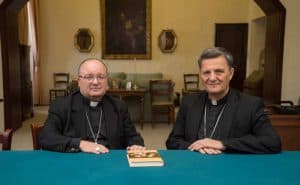This guest post is particularly significant in view of the strong line taken by the Maltese curia today. Read about that here.
The assassination of Daphne Caruana Galizia brought to the fore “the two Maltas” she often spoke about. A segment of the population was outraged and horrified while others thought she had it coming. Well before Mrs Caruana Galizia was laid to rest, these ‘two Malta’s’ congregated around two poles – one has political power, and the other has moral authority.
It is not difficult to distinguish between the two.
On the one hand, there are those who crave power and who want to cling onto their seats – the Prime Minister, the Leader of the Opposition, the Attorney-General and the Police Commissioner. They have all mouthed words of condemnation, but their words ring hollow. They lack credibility, and they cut a pathetic figure. If they had any respect for the position they occupy, they would have resigned by now.
On the other hand, there are those who have emerged as great leaders – beacons of hope in this very dark time for Malta. They don’t have any political power, but they have something which the former will never possess – moral authority. When they speak, people sit up and listen. They are relevant, fresh voices enriching our conversation. They speak truth to power, and they make those who possess power uncomfortable.
They are lone parliamentarians in Malta and the European Parliament who are saddened by the desperate predicament we find ourselves in. They are brave voices who refuse to be drowned out by the chorus of disapproval emerging from ‘the other Malta.’
The Church emerged as one of the strong, credible voices. Led by an indomitable Archbishop who has spoken on the need for true justice, genuine reconciliation and resolute courage in the face of evil, the Church is once again a formidable voice in society.
This voice is not welcome in all quarters. The anti-clerical voices within the Labour Party are incensed by the Archbishop’s words and retaliated by calling him ‘divisive’ and ‘negative’. Some members of the clergy have also been bad mouthing the Archbishop. This behaviour is not unusual. Archbishops have always had to contend with this behaviour.
However, the subtle undermining of the Archbishop of Malta by the Bishop of Gozo sets a dangerous precedent. Bishop Grech is, no doubt, a subtle operator. He only expressed himself on the assassination of Daphne Caruana Galizia after being hounded and prodded by the press.
Surely such a defining moment in Malta’s recent history merited a strong statement of condemnation and solidarity? Did he not, as a priest and a pastor, have a duty to rally the faithful to a Mass for the Repose of the Soul of one whose life was cut so short and so brutally?
Bishop Grech now stated that he would no longer attend State Dinners and encouraged seminarians to shun ‘power’. As with everything that Bishop Grech does, there is more than meets the eye.
No doubt, the good bishop is aware that there is an ongoing debate on constitutional reform and that many close to the Government want to remove Article 2 of the Constitution in the hope of further weakening the church.
 He is undoubtedly aware that many people close to the incumbent administration are unhappy with Archbishop Scicluna’s pronouncements. Not wishing to upset Castille, he is trying to sing out of the same hymn sheet as Joseph Muscat. Perhaps he hopes to be on ‘the right side of history’ – or, at least, on the right side of Joseph Muscat’s history book.
He is undoubtedly aware that many people close to the incumbent administration are unhappy with Archbishop Scicluna’s pronouncements. Not wishing to upset Castille, he is trying to sing out of the same hymn sheet as Joseph Muscat. Perhaps he hopes to be on ‘the right side of history’ – or, at least, on the right side of Joseph Muscat’s history book.
Unfortunately, his behaviour can undermine the voice of the Church. It seems as though he is trying to create a contrast between the socially committed, brave voice of Archbishop Scicluna and his role which serves those who would rather the Church kept its mouth shut on matters which concern the faithful. Perversely, he portrays himself as someone who shuns the trappings of power while trying to curry favour with Castille’s present incumbent.
Bishop Grech once warned us to beware of wolves in sheep’s clothing. It seems that this shepherd has donned the manner of the wolf. As a committed layman, I am concerned. So, if I may, my final words are addressed to Bishop Grech:
Your Lordship,
If you are reading this, know that this is not some attack or campaign against you.
As a member of your flock, I am concerned.
I am concerned that this country is going to the dogs.
I am concerned because a fellow citizen – a journalist – was brutally murdered.
I am concerned because injustice and corruption are undermining the common good.
Do not shun your responsibilities towards your flock.
Do not let your narrow interest surpass the good of those in your charge.
Do not be that wolf in sheep’s clothing you had warned us to beware of.